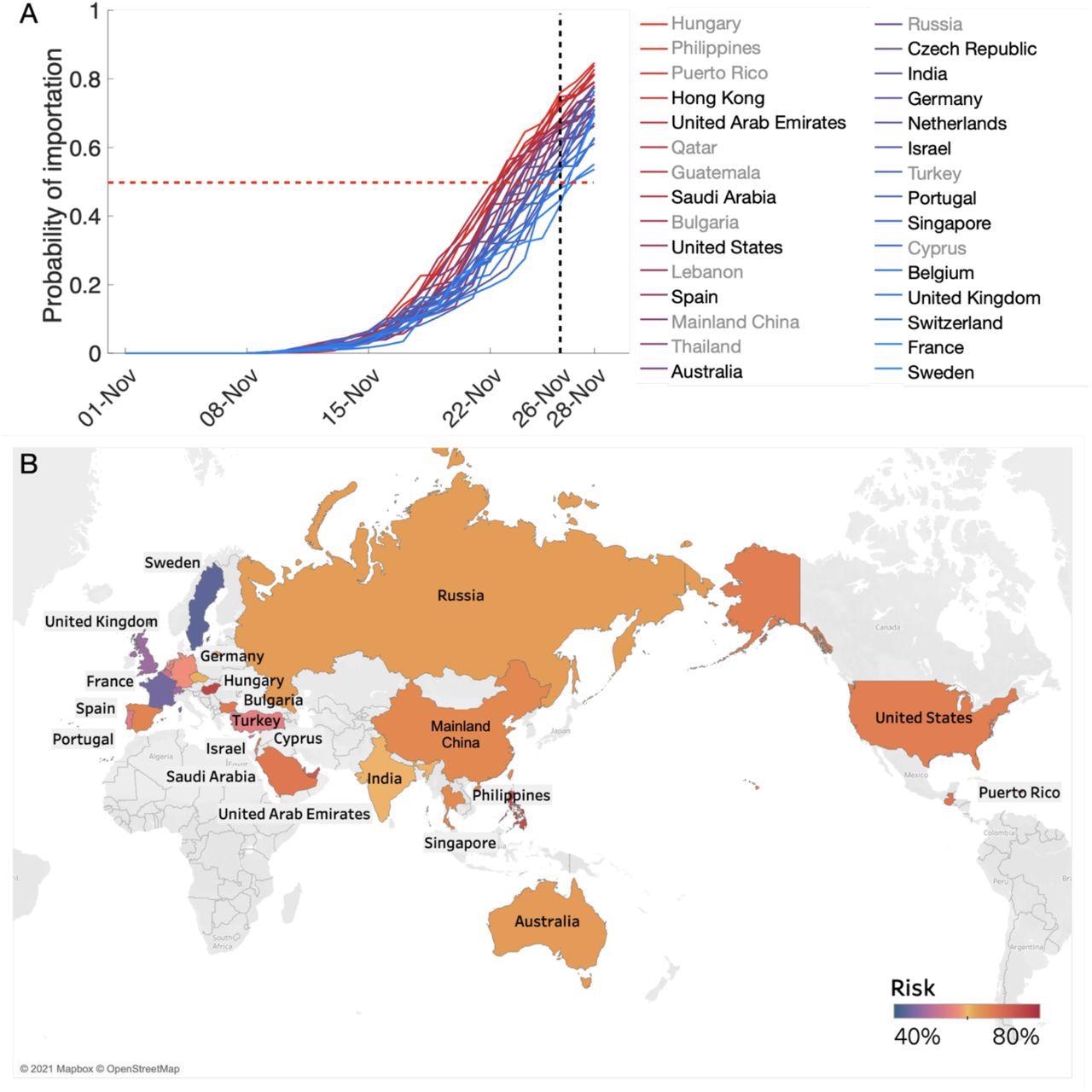The B.1.1.529 Omicron is the latest severe acute respiratory syndrome coronavirus-2 (SARS-CoV-2) variant first detected in South Africa and has spread to more than 50 countries. Since the Omicron variant is associated with increased transmissibility, the World Health Organization (WHO) has classified it as a variant of concern (VOC).
Recently, a multinational team of researchers studied the risk of importation of the Omicron variant by travelers from South Africa. In this study, they analyzed the mobility of travelers from South Africa to 30 non-African countries using travel data collected from Open Sky Network and Facebook Data for Good. They estimated the probability of the introduction of the Omicron variant into each country and the extent of local transmission before November 28, 2021. The study is posted to the medRxiv* pre-print server while awaiting peer review.

Study: International risk of SARS-CoV-2 Omicron variant importations originating in South Africa. Image Credit: Adao/Shutterstock

 This news article was a review of a preliminary scientific report that had not undergone peer-review at the time of publication. Since its initial publication, the scientific report has now been peer reviewed and accepted for publication in a Scientific Journal. Links to the preliminary and peer-reviewed reports are available in the Sources section at the bottom of this article. View Sources
This news article was a review of a preliminary scientific report that had not undergone peer-review at the time of publication. Since its initial publication, the scientific report has now been peer reviewed and accepted for publication in a Scientific Journal. Links to the preliminary and peer-reviewed reports are available in the Sources section at the bottom of this article. View Sources
Findings
The study estimated that 26 out of the 30 non-African countries had a more than 50% chance of having received at least one travel-based importation of the Omicron variant. The remaining four countries ––Switzerland, United Kingdom (UK), France, and Sweden – exceeded the 50% risk threshold on November 27. This importation risk estimate would exceed if the Omicron variant were also prevalent in other southern African nations. Hungary had the highest calculated probability of Omicron importation between November 1 and November 28, 2021.
The UK has reported the highest number of Omicron cases outside African countries despite the lower risk of importation than other countries in the study. This is due to the UK’s robust genome surveillance program that has contributed almost 25% of global SARS-CoV-2 sequences. This shows that the new VOC may be spreading undetected in several countries with similar importation risks due to their poor genome sequencing capacity.
 Estimated risks of SARS-CoV-2 Omicron variant introductions from South Africa to 30 non-African regions on or before November 28, 2021. (A) The probability that at least one person infected with the Omicron variant arrived in a given country from South Africa by the date indicated on the x-axis, based on Facebook mobility and OpenSky data. The black dashed vertical line indicates November 26, 2021, when the WHO classified Omicron as a VOC (1); the red dashed horizontal line indicates an importation probability of 50%; line colors correspond to the relative risk of importations as of November 26. Regions that confirmed Omicron cases by December 3, 2021, are listed in black (2). (B) Probability of at least one Omicron variant importation from SA by November 28, 2021. Regions in grey were not analyzed because mobility data were not available.
Estimated risks of SARS-CoV-2 Omicron variant introductions from South Africa to 30 non-African regions on or before November 28, 2021. (A) The probability that at least one person infected with the Omicron variant arrived in a given country from South Africa by the date indicated on the x-axis, based on Facebook mobility and OpenSky data. The black dashed vertical line indicates November 26, 2021, when the WHO classified Omicron as a VOC (1); the red dashed horizontal line indicates an importation probability of 50%; line colors correspond to the relative risk of importations as of November 26. Regions that confirmed Omicron cases by December 3, 2021, are listed in black (2). (B) Probability of at least one Omicron variant importation from SA by November 28, 2021. Regions in grey were not analyzed because mobility data were not available.
Limitations
The estimates in the study are based on many assumptions. The Facebook mobility data is a reflection of its user base demographics and excluded date-destination combinations. The authors filled in the missing data assuming the ratio between the number of available flight seats and the number of travelers always remains constant.
The study also assumed that all early viral introductions occurred through asymptomatic or pre-symptomatic travelers from South Africa and ignored potential importations by symptomatic cases or from other countries, thus underestimating the risks.
Moreover, the authors assumed a 10-day gap between infection and hospitalization based on estimates from Europe and the US, as they believed that the Omicron variant is similar to the wild-type virus in terms of infection and symptom onset. Thus, their estimates will need to be updated if future studies show significant epidemiological differences between the wild-type virus and the Omicron variant.
Conclusion
Countries with a significant number of direct travelers from South Africa were likely to have Omicron cases by late November 2021. The variant could have been already present in other southern African countries by the time it was classified as a VOC which increases the risk of Omicron cases in countries with travelers from these African nations.
In conclusion, the risk of importation of Omicron cases from South Africa and other southern African nations is high and, by November 27, all countries included in this study had a probability of around 0.5 to have received an Omicron-infected traveler with more than 18 of the studied countries having confirmed Omicron cases by December 3, 2021.

 This news article was a review of a preliminary scientific report that had not undergone peer-review at the time of publication. Since its initial publication, the scientific report has now been peer reviewed and accepted for publication in a Scientific Journal. Links to the preliminary and peer-reviewed reports are available in the Sources section at the bottom of this article. View Sources
This news article was a review of a preliminary scientific report that had not undergone peer-review at the time of publication. Since its initial publication, the scientific report has now been peer reviewed and accepted for publication in a Scientific Journal. Links to the preliminary and peer-reviewed reports are available in the Sources section at the bottom of this article. View Sources
Journal references:
- Preliminary scientific report.
Yuan Bai, et al. (2021). International risk of SARS-CoV-2 Omicron variant importations originating in South Africa. medRxiv. doi: https://doi.org/10.1101/2021.12.07.21267410 https://www.medrxiv.org/content/10.1101/2021.12.07.21267410v1
- Peer reviewed and published scientific report.
Bai, Yuan, Zhanwei Du, Mingda Xu, Lin Wang, Peng Wu, Eric H Y Lau, Benjamin J Cowling, and Lauren Ancel Meyers. 2022. “International Risk of SARS-CoV-2 Omicron Variant Importations Originating in South Africa.” Journal of Travel Medicine, June. https://academic.oup.com/jtm/article/29/6/taac073/6608762.